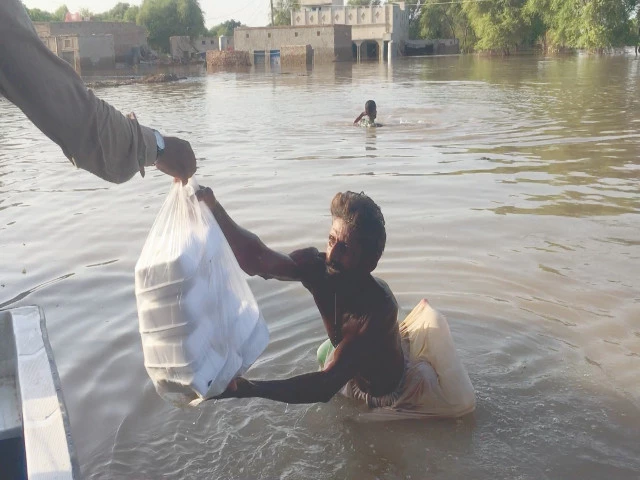Lahore:
Weeks after the flood first hit, villages in Jalalpur Pirwala remain Multan District, Marooned of Flood Water. Hundreds of houses have collapsed in rubble, while thousands of hectares of crops are destroyed. Wheat and rice fields are rotten, mud houses have crumbled, and displaced families, deprived of shelter, now survive in tents.
Local Elder Muhammad Jameel remembered how his home and grain shops were swallowed by the water: “All the food we saved after years of wear and tear has been destroyed.” Another villager, taj yours, his eyes, filled with tears, said, “We will rebuild our houses, but for God’s sake, someone must drain this water. It has swept our lifetime savings, our dreams, everything.” Their stories repeat the situation of thousands that remain exposed under the open sky.
New life in tent settlements
In the midst of this destruction, new hope has emerged. In a tent run, Muhammad Asghar’s wife gave birth to a baby girl, named Ayesha. Asghar, a daily salary worker with two wives, explained that his second wife, who lives in Alipur, also expects a child in the coming weeks. With Ayesha’s birth, his family has now grown into thirteen children – four sons and nine daughters. “On the one hand, we face adversity because of the floods, but on the other, Allah has blessed us with his grace,” he said.
According to Dr. Zafar Cheema, who serves in the camps, is nine babies born so far, including an inside a tent where both mother and child survived safely. “At present, there are 18 pregnant women in three camps who are expected to deliver in the coming weeks,” he said. A female doctor has been deputy for regular checks and ultrasound facilities are arranged. Expecting mothers will be moved to private or public hospitals for delivery when needed.
Yet the greatest difficulty remains for many women. “We have basic supplies, but the lack of laundry room and even soap makes life unbearable,” said Razia Bibi, a camping. Organizers deliver soap, she noticed, but it is rarely available inside the laundry room.
A man living in a tree
The floods have also revealed scenes with extraordinary resilience. Hajji Rasool Bakhsh, a local resident, spent two weeks on a tree in his patio and balanced on wooden planks. He explained that while his family was evacuated, he chose to be behind to protect his home from looting – a common threat in the river areas. “Each family has left at least one or two men behind to protect their belongings,” he said.
Service Spirit from AID Groups
While the floods flushed homes and crops, they also stirred a remarkable humanitarian effort. Pakistan Markazi Muslim League (PMML) has established eight tent villages that house over 10,000 people. Residents are provided with three meals a day, solar panels, fans and mosquito nets.
According to PMML spokesman Muhammad Tabish Qayyum, “Our journey continues from rescue to relief and from relief to rehabilitation.” He said that over 500 volunteers from Lahore, Faisalabad and Karachi help families clean and restore their homes. Temporary schools for children have been set up and medical camps staffed by doctors operating around the clock.
Villagers face ruin and resilience when new lives begin in Tenthe Punjab Disaster Management Authority (PDMA) reports that the water level in rivers is gradually going back, although the destruction scale remains huge. Official figures show that 27 districts in Punjab were directly affected, with over 4,700 villages flooded and nearly 4.7 million people affected. More than 2.6 million were evacuated in safety.
Authorities have established 271 emergency camps and 300 medical camps, while 283 veterinary camps have moved over 2.1 million livestock to higher soil. The floods have claimed 134 lives where many others were injured. Auxiliary Commissioner Nabeel Javed confirmed that injury assessments began on September 24 and promised compensation for victims through a transparent and simplified process.
Complaints and holes
Despite these measures, many residents remain dissatisfied. Families complain that although lunches – often boxes of Biryani – are distributed at government camps, there is little determination for fans, mosquito nets or proper sanitation. Heat and humidity have triggered outbreaks of illness. Disorganized aid distribution has also led to double work, with some families registering in both government and private camps to collect supplies several times, while other needy households remain excluded. Experts claim that a unified system is urgently necessary to ensure a fair and effective delivery of relief.
A ray of hope
Although the floods have crushed home and livelihood, they have not turned off human resilience. Baby Ayesha’s birth in a tent, the tireless work of volunteers and the determination of the affected villagers all point to a future where life will slowly return. The real challenge now is not only to drain flooding water but rebuild broken lives. True improvement, observers emphasize, will only be possible if the government, civil society and the local communities stand together.



